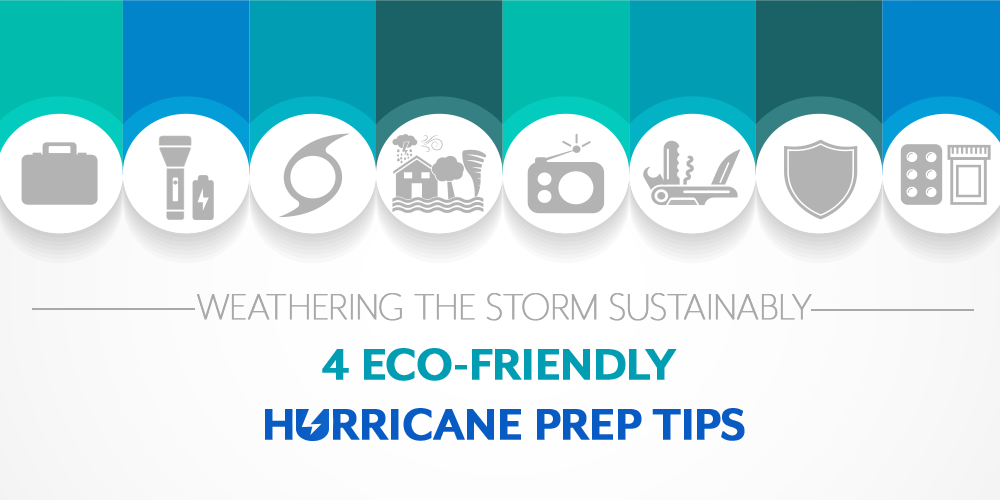Weathering the Storm Sustainably: 4 Eco-Friendly Hurricane Prep Tips

June marks the start of Hurricane Season, and with over 20 named hurricanes in the last decade, it's important that homeowners start preparing for hurricane season to mitigate the potential risks and damages associated with these powerful storms. However, in our efforts to protect our homes, we should also be mindful of protecting the environment through economical, sustainable measures. Sustainable practices not only can minimize the impact of our preparations on the planet but also pave the way for a resilient and eco-friendly future. And with a dozen or more storms forecasted for 2023, the time to start preparing is now.
1. Embrace Renewable Energy
One of the most sustainable steps you can take to prepare for hurricane season is to invest in renewable energy sources. Traditional power grids are vulnerable to outages during severe weather events, leaving us without electricity for extended periods. With a wind rating over 100 mph, solar panels provide a clean, renewable source of energy that can reduce the load on the grid - a plus when the infrastructure is compromised.
By installing solar panels, homeowners can supplement their energy by generating their own clean energy and reducing reliance on fossil fuels. When paired with battery storage systems, homeowners can also store excess energy for use during power outages, ensuring a continuous power supply without harming the environment.
2. Sustainably Secure Your Home
Protecting your home from hurricane-related damage is vital, and it can be done sustainably. Start by fortifying your windows and doors with impact-resistant materials. Opt for sustainable alternatives such as laminated glass or recycled materials that meet impact standards. Additionally, consider installing hurricane shutters made from eco-friendly materials like bamboo or recycled metals. These measures not only provide protection but also reduce waste and carbon footprint.
3. Rainwater Harvesting
During hurricane season, heavy rainfall is common. Instead of letting this valuable resource go to waste, implement rainwater harvesting systems. Collecting rainwater can help alleviate strain on municipal water supplies, conserve water, and reduce your utility bills. Install rain barrels or cisterns to capture rainwater from rooftops and use it for tasks such as watering plants, flushing toilets, or cleaning, thereby reducing your reliance on potable water sources.
4. 'Green' Landscaping
Proper landscaping can make a significant difference in protecting your home during a hurricane while also benefiting the environment. Planting native trees and shrubs can act as windbreaks, reducing wind speed and the risk of structural damage. These plants also provide shade, reduce energy consumption for cooling, and support local wildlife. Additionally, use organic fertilizers and natural pest control methods to maintain a healthy and sustainable landscape.
Other Emergency Preparedness Tips
Prepare an Emergency Kit:
When preparing for hurricane season, it's important to have an emergency kit on hand. However, rather than relying solely on single-use items, create a sustainable emergency kit. Include reusable water bottles, rechargeable batteries, and solar-powered chargers for electronic devices. Opt for energy-efficient LED flashlights and lanterns. Consider packing eco-friendly hygiene and personal care products, along with non-perishable organic food items.
For a complete checklist of essential items, visit the Department of Homeland Security's Build a Kit page.
Create a Family Emergency Plan:
Preparing for hurricanes involves more than just physical preparations. Developing a comprehensive family emergency plan is essential for everyone's safety. Include eco-friendly elements in your plan, such as identifying evacuation routes that minimize carbon emissions, organizing carpooling with neighbors, or using public transportation when possible. Encourage family members to embrace sustainable practices during and after the storm, like conserving water, reducing waste, and recycling.
As hurricane season approaches, our focus should not only be on protecting our homes but also on preparing sustainably and minimizing the impact on our environment. By embracing renewable energy, securing our homes with sustainable materials, and implementing eco-friendly practices, we can create a safer and greener future. Let's take the necessary steps to protect our homes, families, and the planet, ensuring resilience and sustainability during hurricane season and beyond.
